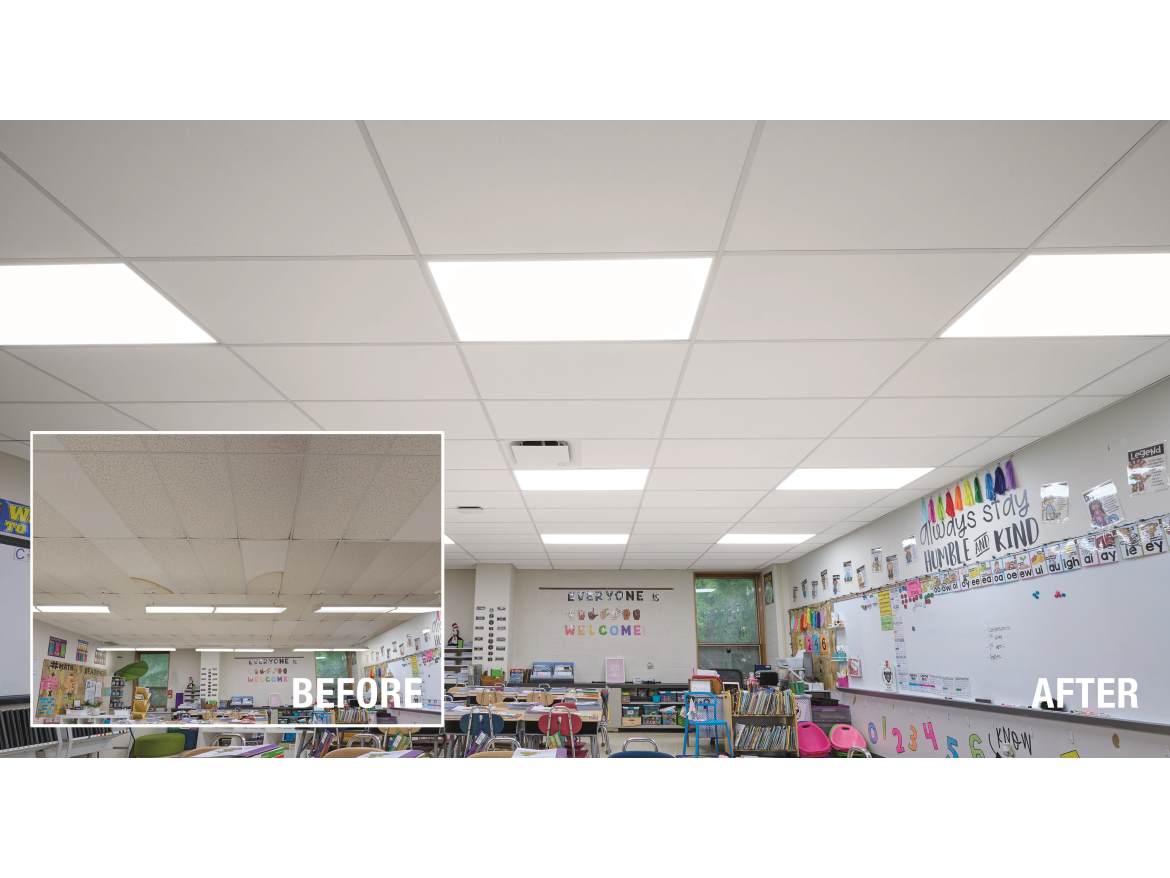Armstrong World Industries is increasing education around its portfolio of Total Acoustics® ceilings to ensure that architects, designers, owners, and managers of buildings of all shapes and sizes are aware of the options that exist for reducing noise and blocking sound from traveling to adjacent spaces.
With a mission of helping decision makers in new construction and renovation projects achieve high-performance acoustics, the Armstrong educational campaign emphasizes the difference between ceiling products that simply absorb sound compared to those that both absorb and block sound. In addition, the campaign illustrates the long-term advantages that can result from an upfront investment in Total Acoustics ceilings, which provide three levels of sound absorption plus high sound-blocking performance in one ceiling panel.
“Ceilings with a high NRC rating (sound absorption) and no CAC rating (sound blocking) can only help absorb sound within a space, but they cannot effectively block sound from leaving or entering the space, proving inadequate for spaces where speech privacy is required,” said Sean Browne, manager, codes and standards, Armstrong World Industries. “In these cases, plenum barriers or finished floor-to-deck walls are needed to block sound between adjacent spaces; whereas Total Acoustics ceilings – with their ability to both absorb and block sound – can save time and money and make future space reconfigurations easier.”
Ensuring Speech Privacy
All Total Acoustics ceilings have a CAC (Ceiling Attenuation Class) of 35 or higher which delivers effective sound blocking, ensuring confidential speech privacy and sound isolation between adjacent spaces that share the same plenum. Moreover, Total Acoustics offers a wide variety of ceiling material options — including mineral fiber, metal, wood, and wood fiber — to provide maximum design flexibility.
“Real-world independent acoustical testing in common-plenum shared offices confirms that high CAC Total Acoustics panels help deliver confidential speech privacy,” explained Browne. “It can be up to two times more expensive to finish walls full-height-to-deck compared to finishing walls up to the ceiling. Plenum barriers, additional finishing, and extra accessories become unnecessary when installing ceilings with Total Acoustics performance.
“Many facilities—from schools and healthcare spaces to law firms and corporate offices—can’t afford the cost or downtime for renovations if sound absorption alone doesn’t cut it in terms of noise control and speech privacy,” Browne continued. “Consequently, they end up just living with it and the occupant experience remains subpar. All this can be avoided by choosing a Total Acoustics ceiling with a combination of sound absorption and blocking from the start.”
The Right Acoustics for Every Space
Realizing that different spaces have different needs, Armstrong focuses on providing Total Acoustics solutions that match the purpose of the facility – whether it’s education, healthcare, or offices -- and address specific needs of its occupants, all while supporting the design vision. To help customers understand their own needs and select the best product for their project, Armstrong offers a complimentary custom acoustical report. Moreover, the company has an NVLAP-accredited acoustical testing laboratory on its Lancaster campus to help ensure quality control and products that evolve with the changing needs of today’s world.
Because of their ability to both absorb and block sound, ceilings with Total Acoustics performance contribute to the well-being, comfort, satisfaction, and productivity of building occupants, meeting standards such as WELL™ and LEED® and addressing acoustical design guidelines, including ANSI/ASA S12.60, FGI Guidelines, HIPAA, and HCAHPS. These attributes are proving more and more important as society places elevated importance on Indoor Environmental Quality (IEQ) and its effect on occupants of indoor spaces.
Specifying the Right Ceiling
To make it easy to specify the right ceiling for a space, Total Acoustics panels are rated as good, better, and best based on their combination of sound absorption and sound blocking. To meet the criteria for Total Acoustics performance, ceiling panels must have an NRC (Noise Reduction Coefficient) of 0.60 or greater and a CAC of 35 or greater. Ceilings without a published CAC value do not adequately contribute to sound blocking.
Ceiling panels featuring Total Acoustics performance are available in a variety of product lines, including Calla®, Lyra® PB, Ultima®, AcoustiBuilt®, WoodWorks®, MetalWorks™, Tectum®, Fine Fissured™, School Zone®, Cirrus®, Canyon®, and Mesa™. Most Total Acoustics panels are part of the Sustain® portfolio and meet the most stringent sustainability compliance standards today. For more information about Total Acoustics ceiling panels and how to choose the right ceiling for a space, visit armstrongceilings.com/totalacoustics. If help is needed, reach an Armstrong TechLine expert at armstrongceilings.com/techline.



